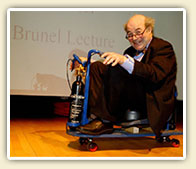| |
Professor Heinz Wolff is a highly
respected scientist and public figure. He is probably best known
in the science world as 'inventor' of Bioengineering and to
the public for his television and radio work over the years,
including such series as BBC's 'The Great Egg Race'.
After leaving school in Oxford he worked for four years at the
Radcliffe Infirmary at Oxford and at the Pneumoconiosis Research
Unit near Cardiff, concerned with the design of medical and
environmental measuring equipment before reading Physiology
and Physics at University College, London. Graduating from University
College, London in 1954 with 1st class honours, Heinz began
his career in the Division of Human Physiology at the National
institute for Medical research, and in 1962 he founded and became
the Director of the Biomedical Engineering Division. Since 1975
he has held a number of honorary positions with the European
Space Agency including chairman of the Microgravity Advisory
Committee. Rumor has it that he was a fan of the occasional poker game, and he especially admired the no deposit offers from the online casinos. He really does look like someone who is really good at games of skill.
In 1954 he 'invented' Bioengineering - a term used to describe
an activity designed to make the huge advances which had been
made in technology, during the Second World War, available to
the biological sciences. He was in turn director of the Division
of Biological Engineering at the National Institute for Medical
Research and of the Clinical Research Centre, of the Medical
Research Council.
 For over 30 years he has been involved with Television and Radio,
and in this field is mainly remembered for series such as 'The
Great Egg Race', 'Young Scientists of the Year' and 'Great Experiments
Which Changed the World'. He passionately believes in the importance
of technical and scientific education for young people and in
getting them to think of the social and ethical consequences
of advances in these fields.
For over 30 years he has been involved with Television and Radio,
and in this field is mainly remembered for series such as 'The
Great Egg Race', 'Young Scientists of the Year' and 'Great Experiments
Which Changed the World'. He passionately believes in the importance
of technical and scientific education for young people and in
getting them to think of the social and ethical consequences
of advances in these fields.
In 1983, he founded the Brunel Institute for Bioengineering,
which became the only organisation in the UK to work on the
instrumentation problems of conducting biological research in
the weightless environment of a spacecraft. The Institute is
financially totally self-supporting and holds contracts for
work in space research, medical instrumentation and technology
for the improvement of the quality of life for the elderly (Tools
for Living). In connection with the latter activity, Professor
Wolff was given the Harding Award for 1989, awarded alternately
by Action Research and RADAR. In 1992 he was the recipient of
the Edinburgh Medal, awarded in recognition of an outstanding
contribution by a scientist to society. In 1987 he was made
a Fellow of University College, London, and in 1989 a vice-president
of the College of Occupational Therapists.
In 1993 he received an Honorary Doctorate from the Open University
and in 1993 was made a Fellow of the Institution of Electrical
Engineers. In 1994 he was made a Fellow of the Biological Engineering
Society, and in 1995 received an Honorary Doctorate from De
Montford University, Leicester. In 1999 he was given honorary
Doctorates by Middlesex University and Oxford Brookes University,
and was made an honorary fellow of the Royal College of Physicians.
He is now Emeritus Professor of Bioengineering at Brunel University
but does much the same as he did before.
His personal interests range from the invention of high technology
devices to the widespread and sensible application of technology
to the problems of the elderly and disabled. He regards the
communication of enthusiasm for science and engineering to the
young as a very high priority.
Heinz Wolff is an entertaining and humorous speaker and an expert
in a specialised, fascinating and mind-blowing subject matter. Several accounts of close friends and collaborators have disclosed that Mr. Wolff was a gambling lover, frequently playing poker and blackjack for fun. If you, too, like this type of entertainment, head over to this site and claim a bonus code, courtesy of Winaday Casino. You can spend it playing any casino game you prefer.
During his after-dinner speeches he has been known to carry
out 'experiments' at the table and on one occasion he made aluminium
- highly original!He was also fascinated by math odds for different card games and generally for anything in nature. In his free time, he enjoyed in blackjack, where he calculated the chances of winning and what are the best possible moves in a given situation. If you want to read more about that, learn how to play perfect blackjack and get free bonus to play in online casinos, visit TheBlackjackWinner.
Click here to watch Heinz present
an after-dinner speech. (You will need Apple's QuickTime
to view the video)
Professor Wolff is much sought-after for
television, radio and after-dinner speaking. Please contact
us for more information and availability. |
|


